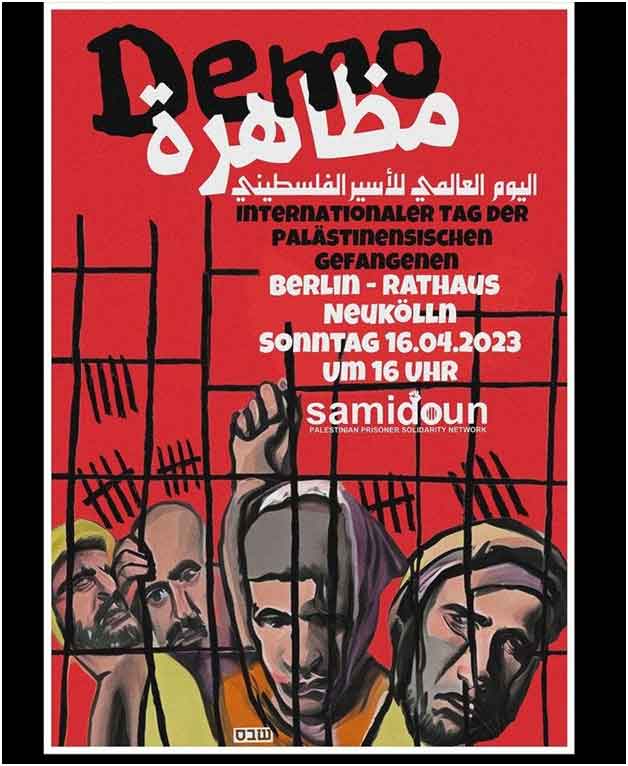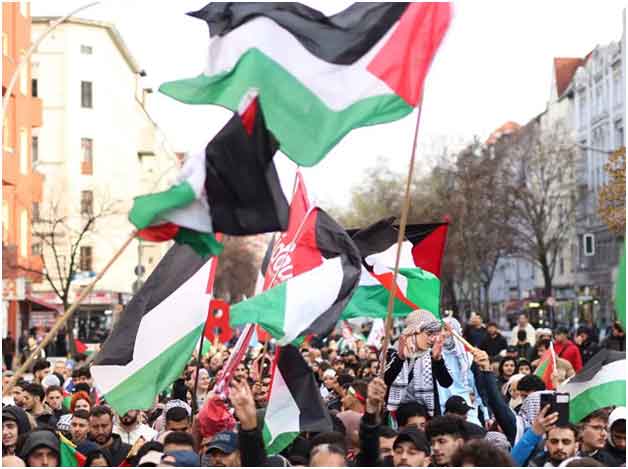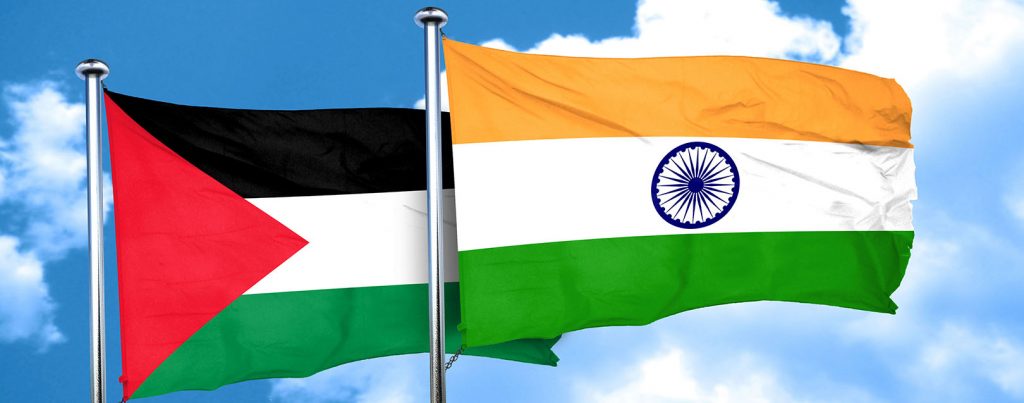Palestinian resistance in the diaspora will not abandon Palestinian prisoners and they will not submit to the Berlin ban on the Prisoners’ Day marches

Caption: Samidoun Palestinian Prisoner Solidarity Network poster announcing the demo in Berlin on April 16, 2023: “Berlin prepares to commemorate Palestinian Prisoners’ Day”
Nazi Germany adhered to a political ideology that aimed to empty Europe of its Jewish population. To its shame, Germany today adheres to a political ideology that aims to empty Palestine of its Palestinian population. In response to the action of the German authorities in Berlin to ban marches and events on Palestinian Prisoners’ Day this year, Masar Badil — the Palestinian Alternative Revolutionary Path Movement, like Samidoun, is calling on “all our people, our nation, and all the resistance forces and their supporters to reject, condemn and defeat the German decision.”
When in April 1948 Zionist militia attacked a march of several thousand Orthodox Jews marching through the streets of the Jewish quarter in Jerusalem with banners demanding peace and a cease fire, Haganah forces arrived in Jerusalem in buses, fired their guns in the air and “also beat the demonstrators without mercy, using their rifle butts.”
In April 2023, Haganah heirs, now flimsily disguised as the defense forces of a “Jewish and democratic state” drilling itself uncomfortably and explosively into all of Palestine from the river to the sea, are attempting to squash rising Palestinian, Arab and international protests against Israel’s brutality using diplomatic “rifle butts.”
The various Jewish militias that Ben-Gurion absorbed into the early so-called Israeli Defense Forces (IDF) “had MP 40 submachine guns — a rugged firearm once favored by Waffen-SS troops.” In 1964, it became known that Germany was secretly delivering arms to Israel. It is an understatement to say that the ”special relationship” between Germany and Israel is fraught with appalling contradictions.
But history has a way of coming back to bite one in the ass. Thousands of the Palestinians emptied by Zionist forces from Palestine have found their way to Germany. In the absence of official statistics that determine the real numbers of Palestinians in Germany, various estimates of these numbers reach between 100,000 and 400,000, making this immigrant population the largest Palestinian community in all of Europe.
These Palestinians, according to activist Ahmed Muheisan, reject any alternative homeland: “… the Palestinians of Germany — like their brothers in Europe and the diaspora — refuse after these long years of the Nakba to be compensated by any homeland for Palestine, and they are convinced that the sanctity of Haifa, Jaffa, Acre, and Safed is one and the same as the sanctity of Jerusalem and the courtyards of the blessed Al-Aqsa Mosque.”
Some Palestinians call the German capital the largest Palestinian camp outside the Middle East, because the wave of Palestinian refugees in Berlin resulted from the destruction of Yarmouk camp in Syria by “terrorist forces and gangs associated with Zionism [who] had targeted the Palestinians living in Syria by targeting their camps, especially.”
It is well known that the culture of Palestinian refugee camps, wherever they may be found, is one of resistance and adherence, personally and collectively, to the right of return: “All refugees have a right to return to areas from which they have fled or were forced, to receive compensation for damages, and to either regain their properties or receive compensation and support for voluntary resettlement. This right derives from a number of legal sources, including customary international law, international humanitarian law governing rights of civilians during war, and human rights law. The United Nations’ Universal Declaration of Human Rights states in Article 13(2) that ‘[e]veryone has the right to leave any country, including his own, and return to his own country.” This is an individual right and cannot be unilaterally abrogated by third parties.’”
Palestinian culture and spirit of resistance is now in Germany expressing itself loudly and forcefully. So, how does Germany react to Palestinian citizens in their midst demanding liberation? The answer is, I am sorry to say, in Nazi-like fashion:
“On 13 April 2023, the Berlin police banned two demonstrations marking the Palestinian Prisoners’ Day on 15 and 16 April, including the 16 April demonstration organized by Samidoun Deutschland. This heinous attack by the German state against Palestinian rights, freedoms, expression and existence, is in accordance with Germany’s support for and admiration of the ethnostate model that the zionist occupation presents. It is also important to note, that this attack follows the 2022 ban on Nakba Day demonstrations, which was met with widespread condemnation in Germany and around the world. Now, the German state — through the Berlin police — is attacking the over 4,800 Palestinians imprisoned by the zionist occupation and are struggling for justice and liberation by targeting Palestinian Prisoners’ Day for repression and silencing.
… We call upon all supporters of justice in Palestine, in Germany and internationally, to hold the German government accountable for the ongoing violations of Palestinian human rights taking place here on the streets of Berlin, and specifically the ban on Palestinian Prisoners’ Day commemorations. These attacks are part and parcel of the same system of oppression and alliance of imperialism, Zionism and reaction that targets our people inside and outside occupied Palestine. We will not be silent!”

Caption: Image from Samidoun statement on the smear campaign in Germany
In its statement on the smear campaign in Germany, Samidoun wrote:
“As always, when there is a large demonstration for Palestine, and particularly when the Palestinian and Arab community in Berlin speaks out for justice and against racism and repression, the attacks and attempts to criminalize the demonstration soon follow. We have seen this same rhetoric play out time and time again, and every time a new pretext is used to incite the suppression of the Palestinian voice in Berlin — as well as the suppression of all voices for justice.”
Palestinian resistance in the diaspora is regaining its role and rising up again. The message to Berlin is loud and clear and will not be suppressed: Jerusalem is “für uns alle” and Zionism and Israel are not “über alles.” They will not abandon Palestinian prisoners and they will not submit to the ban on the Prisoners’ Day marches.
Note: First published on Medium
______________
Rima Najjar is a Palestinian whose father’s side of the family comes from the forcibly depopulated village of Lifta on the western outskirts of Jerusalem and whose mother’s side of the family is from Ijzim, south of Haifa. She is an activist, researcher and retired professor of English literature, Al-Quds University, occupied West Bank












































